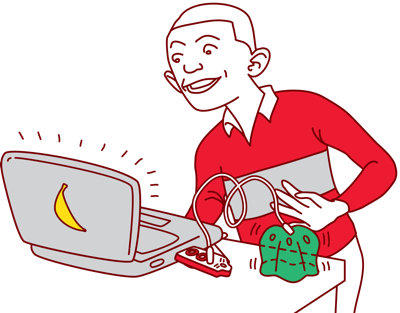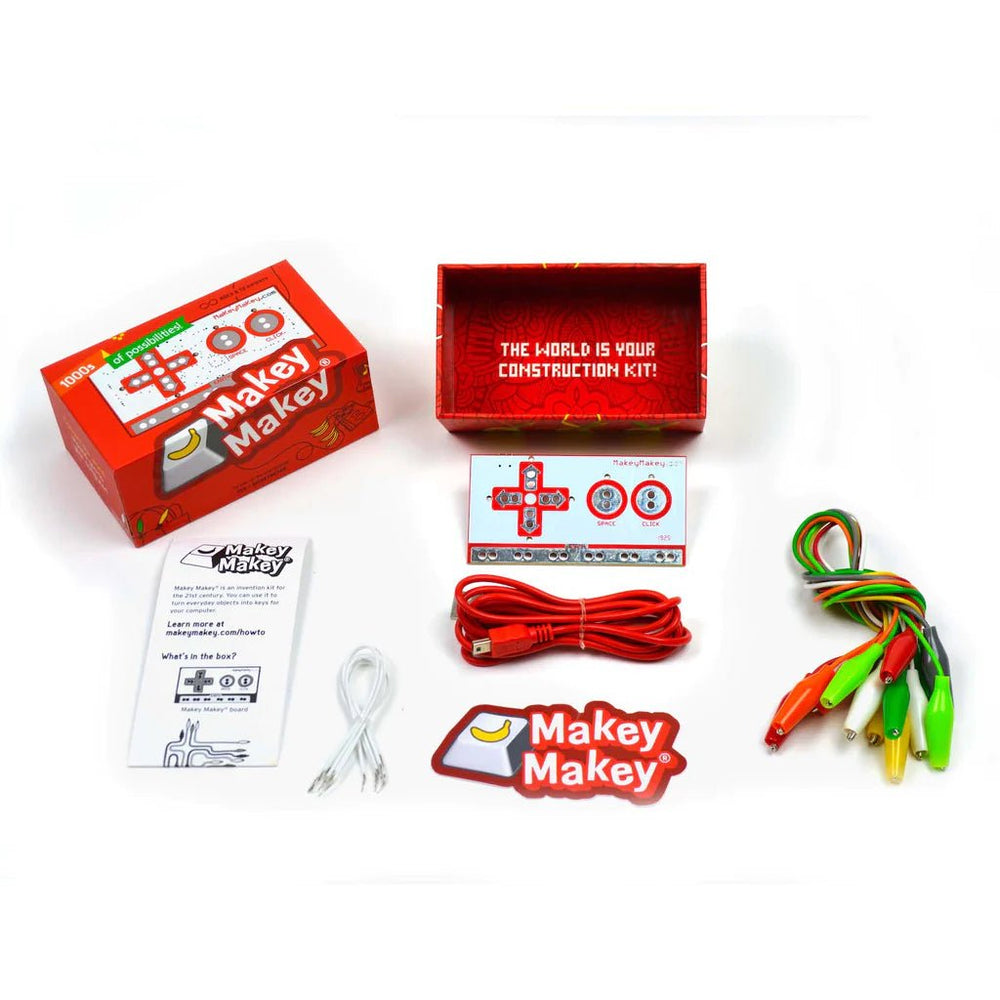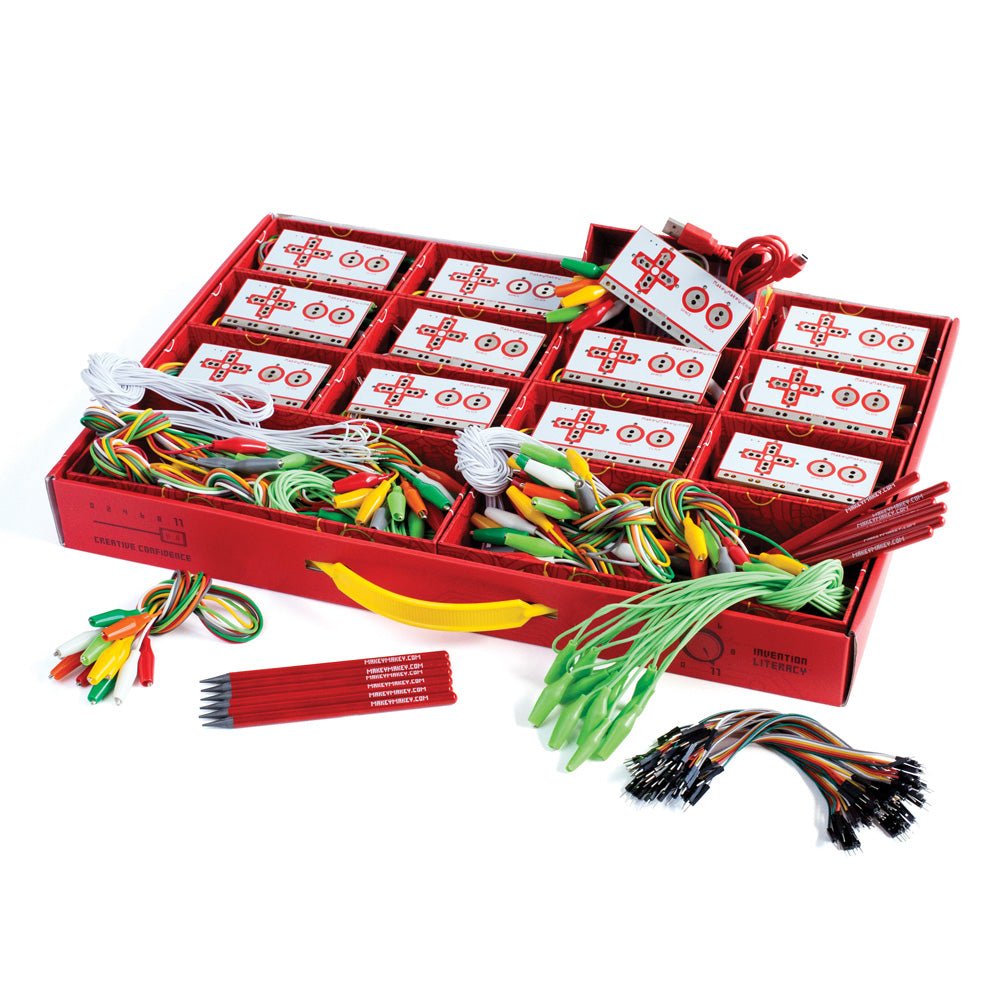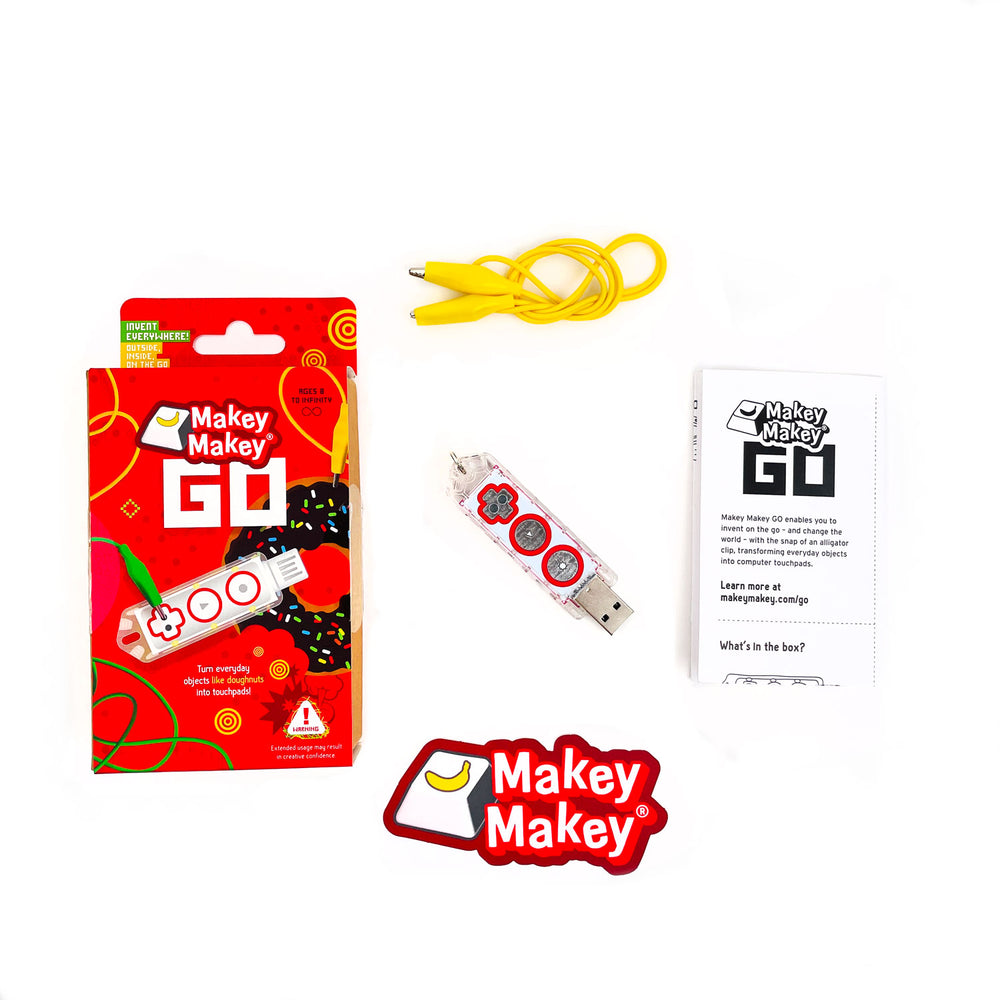Featured Educator: John Lynch and Susan Klimczak
Featured Educator Series
We love the innovative ways that educators (in both formal and informal learning spaces) introduce learners to the concept of physical computing with Makey Makey and coding languages like: Scratch, Processing, and Python. Each month, we will feature an educator and a unique project they've worked on recently. To read more educator posts, simply sign up for our newsletter and we'll guide you to our best content!
Meet this month's featured educator: John Lynch and Susan Klimczak

John Lynch is a Teacher, Maker, Game Designer, and Dad. He’s really interested in adding movement to game design and is currently designing controllers that require movement powered by Makey Makey and Micro:bit. Check out his projects here and build your own!
Susan Klimczak is a community education worker who runs a phenomenal program for Boston Youth called Learn 2 Teach Teach 2 Learn.
We contacted them because we saw these cool controllers on Twitter with the #explodethecontroller hashtag and we already know about Susan's impactful work with Boston youth!
 We had to know more about this active scene!
We had to know more about this active scene!
Explode the Controller Workshop
This scene is part of the "Explode the Controller Workshop." For this workshop, John built multiple controllers that required lots of movement. He created a bounce box with tennis balls and Makey Makey for jumping games and a “slap controller” spaced far enough apart that the participants had to run (or jump) to slap the switch as needed. In the beginning, they had participants use and then remake the controllers, but John and Susan have been taking this workshop on the road! They’ve used it in many different ways. Sometimes they present the exploded controllers to youth and then challenged them to create Scratch games for the controllers. Other times they gave the students games like Flappy Bird and challenged the students to make their own exploded controllers. Last April they did a Creative Learning Workshop for Educators at the MIT Media Lab Lifelong Kindergarten in Boston which involved showing and encouraging educators to make their own games and build their own controllers.
Thanks to everybody who came out to the #ExplodeTheController Arcade! If you're interested in making your own controllers, build instructions are on my website: https://t.co/SP9td3mHcj#ScratchMIT2018 pic.twitter.com/9WkLe20MdR
— John Lynch (@Mittensbrother) July 26, 2018
Susan said Learn 2 Teach, Teach 2 Learn (L2TT2L) teen youth teachers took the slap switches and exploded controllers and the Makey Makeys out to 25 community organizations during their free summer STEAM Camps they offer to over 600 Boston children. L2TT2L youth teachers take simple Scratch games and then challenge the kids to design their own controllers for their own games. Susan remarks that the best thing about this is that, “Children can choose to make their own game or focus on the engineering aspect of designing a controller.” At the Meadowbrook school, John and Susan led professional development and had the educators build their own controllers.
Here are the First Three Exploded Controllers:
- A Bounce Box: This wooden trampoline is a giant pressure switch with tennis balls as an insulator. When students jump the pressure sensor reads a key press. It’s a great one button game controller!

- A Slap Switch: Slap Switches are simple resistance touch switches, designed to survive a wallop from the players running and jumping to reach them. They are cheap and easy to make, and can be assembled without soldering.
Dressing up this Slap Switch with some vinyl scraps for #ASTC2018. Come see #ExplodeTheController at the @scratch presentation with @zackboston and others, Saturday at 2! pic.twitter.com/93Zlux9yyN
— John Lynch (@Mittensbrother) September 27, 2018
- The Rock: The Rock is a Tilt Controller set atop a fifty pound, concrete semi-cylinder. Equipped with the Micro:bit, it's a tilting game controller that promotes balance and coordination.

Why add more movement?
John: A lot of gaming is sedentary now, and I’d like to get more physical activity into coding and engineering projects. Raising my own child, I realized I had to include exercise to get my kid to play and get sleepy, but also movement is just more fun. I’m always looking for opportunities to get more physical activities into the classroom. Children can’t sit still all day. Just having a simple movement throughout the day gives the kid’s an opportunity to rest their brain and use their body instead.
Tell us more about the Learn 2 Teach, Teach 2 Learn Program (L2TT2L)
Susan: L2TT2L is a 17 year old STEAM maker program that engages Boston youth with the creative possibilities of technology, engineering and coding to catalyze cultural change in our communities about what is possible to achieve. Each year we hire 36 teen youth teachers who represent Boston. In the spring, they learn 6 different technologies: computer and physical programming, electronics, digital design and fabrication, alternative energy and a topic in mechanical engineering. In the summer they build projects that solve community issues they think important to gain confidence and competence in their skills. The last 4 weeks of the summer, these teen youth teachers take what they learn “on the road,” all over Boston, traveling to 25 community organizations to teach free summer STEAM camps in the neighborhoods of Boston most in need of education resources.
What inspired you to create this workshop?
John: I was looking at the user interface of a controller, and I thought what would happen if I blow up an Xbox controller and moved the buttons around. Plus, I live near and grew up down the street from Susan’s shop. As an elementary teacher taking time off to raise my own children, I still wanted to volunteer as a neighbor at the center and get involved with STEAM projects. Last January I showed a Scratch project to Susan and she asked me to pitch this idea for the Scratch Conference at MIT. We got accepted and at the Scratch conference we shared all the controllers, people wrote a couple of games, and some educators made some really neat new exploded controllers.

Teachers playing with John's Slap Switches at MIT
Susan: Some of the children who participate in our STEAM camps were introduced to Scratch at school, but the teaching methods used lacked a sense of tinkering and personal exploration. So sometimes they groan when they learn they are “doing Scratch” in our activities. Using the Makey Makey with creative controllers turns things around, making it exciting for them to create and play simple games, seeing a fun use for Scratch.
What was the challenge or instructions you presented to the students?
John: I asked them (and myself) “How do you incorporate physical activity into coding and game design?” Another way to ask this is “How can you add movement to your STEAM classroom?”
Sometimes we had the device built and challenged kids to make a game for it, and other times we’d start with a game and challenge students to create a controller.
What did you like best about this workshop?
Susan: In L2TT2L program, the children loved learning about what is conductive or not conductive, then making their own controllers with wacky conductive objects to play Pacman all powered by Makey Makey. We also had them hook up one of our slap switches to a starter jumping game and children hacked and personalized the jumping game and some made their own games. Another thing that was really cool is that the children set up a Games Arcade, and if a game was too easy to play or didn’t have enough movement, the children made it harder. If a game was too hard, they moved the slap switch. (John notes: Use painter’s tape instead of duct tape when placing your Slap switch in an arcade set up so you can keep the paint on walls and floors intact and safe!)
I also had a Tufts University / Tisch College Summer Fellow named Fuhu who designed and built a really innovative Flappy Bird controller that involved getting grounded by wearing a chicken hat with conductive fabric and a washer sewn inside!
 We love all of it! What’s next?
We love all of it! What’s next?
John: I’m designing a basketball switch and really revisiting the game design part. I’m very interested in game design curriculum. To me, video game design is like making art, you step away and take a look at it, and then realize what you want to change. Susan and I are also teaching a 6 week class at the Lenox Housing Development for Roxbury’s Vibrant Boston children to pilot how to broaden learning and designing Exploded Controllers with Makey Makey for our youth.
Susan: Exploded Controllers are on the road in Boston and Beyond! Our L2TT2L youth teachers presented the Exploded Controllers last week to a lively and excited group of workshop participants at the Association of Science and Technology Centers conference in Hartford, Connecticut last weekend. Plus, we have an exploded controller booth at the Boston Mini-Maker Faire this weekend. In the middle of October, L2TT2L youth teachers are featured guest speakers at Dr. Karen Brennan’s very popular T550 “Designing for Learning by Making” course at the Harvard Graduate School of Education.
We’re looking forward to bringing an Exploded Controller Arcade to the hallways of Longfellow Hall for the 120 graduate students to try before class and during their break!
The #ExplodeTheController arcade joins the noise at the Boston Mini Maker Faire, October 6th and 7th!
— John Lynch (@Mittensbrother) August 16, 2018
Come for the bouncing and slapping, stay for the #CreativeComputing #BosMakerFaire18 pic.twitter.com/RlHWQSWdZw













 We love all of it! What’s next?
We love all of it! What’s next?